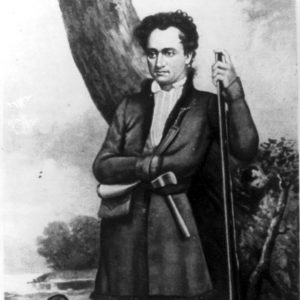calsfoundation@cals.org
Stephen Fuller Austin (1793–1836)
Stephen Fuller Austin, most widely known as the “Father of Texas,” spent a short period of his life in Arkansas after leaving Missouri and before heading south to establish the Lone Star Republic now known as Texas. Austin spent only a brief time in Arkansas, but there are various partnerships cited and references to his presence in historical notes regarding the settling of southwestern Arkansas.
Stephen Austin was born on November 3, 1793, near a lead mining area in Austinville in Wythe County, southwest Virginia, to Moses Austin and Mary Brown Austin. He was the second of five children. His father, Moses, was the pioneer who originally obtained the land grant from Mexico for an American colony in Texas. Moses died before he could see this project come to fruition but bequeathed his grant to Stephen to complete.
Austin grew up in southeast Missouri in the lead mining region forty miles west of St. Genevieve and the Mississippi River. He was interested in Mine á Breton, a mine still under royal domain of the Spanish, which was left to stand idle due to Indian hostilities. Except for August to November, when the miners from St. Genevieve worked as a group to ensure their protection, the vast stores of lead were untouched most of the year. Forming a partnership and applying for a vast land tract of over 17,000 acres (four leagues) around the mine, Austin’s father not only mined, smelted, and manufactured lead but also established a general store that young Austin managed after finishing school.
Austin’s father wanted him to receive a good education, so he sent him, at age eleven, to the Bacon Academy in Colchester, Connecticut, from 1804 to 1807. Austin then continued his education at Transylvania University in Lexington, Kentucky, for another two years.
After finishing school at age seventeen, Austin worked in business with his father, first running the general store in Potosi, Missouri, a town Moses helped to create, and later managing his father’s mines, which were already in financial trouble.
Austin accomplished quite a lot as a young adult. In May 1813, he received an adjutant’s commission in the Missouri militia. In September of that same year, he enlisted as a private in the First Regiment of Mounted Militia and was a quartermaster sergeant at the time of his discharge in October 1813. Austin also became a Freemason, joining Louisiana Lodge No. 109, the first Masonic lodge west of the Mississippi River, and later transferring to Louisiana Lodge No. 111.
He was elected and reelected each year from 1813 to 1819 to the territorial legislature of the Missouri Territory and, with his government connections, was influential in business dealings with the Bank of St. Louis, becoming one of its directors. However, the bank encountered financial difficulties and failed. This failure led him to the Arkansas Territory, where he had acquired a tract of land on the Red River in a place called Long Prairie, near what is now Lafayette County in far southwest Arkansas. Although he did not stay in Arkansas long, he established a farm with some of the merchandise he brought from Missouri, assumed to be from the disposition of the Potosi business.
The Arkansas Territory was originally part of the Louisiana Territory, which was renamed the Missouri Territory to avoid confusion when the state of Louisiana joined the Union in 1812. Seven years later, the Arkansas Territory was separated from the Missouri Territory, as Missouri was also seeking statehood.
Having experience in politics in Missouri, Austin ran for election as a delegate to the U.S. Congress on November 20, 1819, when Arkansas was trying to establish a higher level of government with an elected General Assembly. He was defeated by James Woodson Bates. He then was appointed circuit judge of the first judicial district of the territory by Governor James Miller in 1820 but only held the position during July and August before heading to Natchitoches, Louisiana, and then to New Orleans in December.
In New Orleans, Austin stayed with a lawyer friend, Joseph H. Hawkins, formerly a U.S. congressman from Kentucky who relocated to New Orleans in 1818. Austin went to study law but ended up editing a newspaper by 1821. During this time, his father was on his way to San Antonio to apply for the land grant, a venture that did not excite Austin. Joseph Hawkins was instrumental in persuading him to help support his father’s dream of settling 300 families in Mexico by loaning Austin money for the venture. Moses died suddenly of pneumonia in 1821. His death thrust Austin into his new journey in establishing the colonization of Texas. His technical Mexican title was “empresario,” or colonization agent. He carried out his father’s plan to populate Texas with American emigrants, specifically slave-owning emigrants, despite Mexican laws limiting or even forbidding slavery. This led to the establishment of a new republic that would become the state of Texas, thus earning him the title, “Father of Texas.”
He died of an undiagnosed disease, most likely pneumonia, in a two-room clapboard shack on December 27, 1836, at age forty-two.
For additional information:
Baker, Eugene C. The Life of Stephen F. Austin: Founder of Texas, 1793–1836. Austin: University of Texas Press, 1926.
Burrough, Bryan, Chris Tomlinson, and Jason Stanford. Forget the Alamo: The Rise and Fall of an American Myth. New York: Penguin Press, 2021.
Cantrell, Gregg. Stephen F. Austin: Empresario of Texas. New Haven and London: Yale University Press, 1999.
Moses and Stephen F. Austin Papers. Center for American History. University of Texas at Austin, Austin, Texas.
Stephen F. Austin Collection. Special Collections. University of Houston Libraries, Houston, Texas.
“Stephen Fuller Austin.” The Handbook of Texas Online. https://www.tshaonline.org/handbook/entries/austin-stephen-fuller (accessed April 20, 2023).
Strickland, Rex W. “Miller County, Arkansas Territory, The Frontier that Men Forgot.” Chronicles of Oklahoma 18 (March 1940): 12–34.
Susan Martinez Heinritz
Little Rock, Arkansas
 Stephen Austin
Stephen Austin 



Comments
No comments on this entry yet.